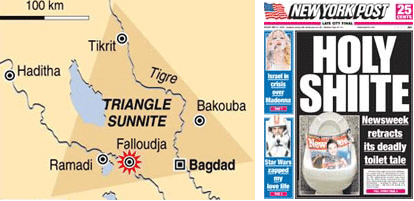
If the Muslim World fit the blurred binary vision of columnist Thomas Friedman, the problems of the Middle East could easily be reduced to a choice of words that start with the letter s. In his Wednesday, November 16, 2005 op-ed piece in The New York Times, Mr. Friedman beseeches a silent Sunni majority to ask the question, “why anyone?” He correctly notes that “Suicide bombs taint the heart of Islam.” Given ongoing suicide bombing inside and outside liberated-and-now-occupied Iraq, we are reminded, “‘Here’s Ahmed – he blew up 52 Muslims at a wedding.’ ‘Here’s Muhammad – he blew up 25 Shiites at a funeral.'” Tell us ‘taint so’ Ahmed. Tell Muhammad’s children that Abu just went straight to hell. “So why don’t more people in the Sunni world speak out against the Sunni Arabs doing this?” he asks, not really expecting an answer.
Friedman suggests that the reason is, in part, because the Sunni silent majority have a “grudging respect” for suicide bombers who take out people they hate or attack institutions they find oppressive. “It’s also because the Sunni silent majority isn’t all that upset when suicide bombers blow up Jews, Christians or Shiite civilizations,” he argues. “The Saudi silent majority often extols such suicide bombers as “martyrs” or “the resistance.” Dear Mr. Friedman … in the vast world of Islam today, the Wahhabi Oil Kings of Saudi Arabia are not in the majority.
I don’t have an answer for the suicide bombings, which I find as repugnant and counter-productive as Mr. Friedman does. But I do have serious questions about his answer. Just who makes up this Sunni majority? Most Muslims throughout history fall academically under such a label, but only when opposed to the alternative splinter party in the historical binary, that is the Shi’a. First, let’s get the terms right. Have we not had enough of Mr. Friedman’s Shiite reporting, when Shi’a is to be found in the Oxford English Dictionary? Either choose Sunni and Shi’a or slide back into Sunnite vs. Shiite, in which case Hamas (or the Hamasites, if you insist) are blowing up Israelites and not Israelis. The least a reader could ask from a prize-winning journalist is a little consistency.
The Sunnis constitute a majority today because the term has little meaning for Muslims except when paired with the marginalized rival party of ‘Ali, whose insistence on a narrow line of imams led to an alternative theology and who periodically had political success. But there is no Sunni caliphate anymore and for most of the time after Arabian Nights’ Harun al-Rashid in Baghdad it was a caliphate in name only. There is no pragmatic sense of Sunni in a world with multiple traditional law schools, innumerable scholars with followers after centuries, a wide range of polities shaped by Muslim leaders, and the overlay of cultures and languages from Berber North Africa to the Great Wall of China. Similarly, to be Shi’a is to be more than the twelvers of Iran and those who service the holy sites of Karbala and Najaf in southern Iraq. Yemen, for example, was historically divided between Zaydi Shi’a in the northern highlands and Shafi’i Sunni in the south and along the coast. So does Mr. Friedman think they watch al-Jazeera and cheer for the opposing sides the way many Americans watch the Israel-Palestine dilemma on CNN and Fox? And who would the Ismailis root for?
Friedman suggests that “there is a civil war going on in the Sunni Muslim world today.” Historically, this has been true every year since the death of the Prophet. The political history of Islam has been one long civil war, not unlike the history of Christianity in Europe until the Enlightenment. But few Muslims need to form an identity at such a broad and obvious level, when the problems are always closer to home. Sunni and Shi’a are dueling today with suicide in Iraq only because of the American liberation and occupation. When Saddam invaded Iran in 1980 no one, not even Mr. Friedman, was saying here were the Sunnis going after the Shi’a again. When Saddam took over Kuwait, was it styled a skirmish in another internal Sunni civil war?
Mr. Friedman, there is no civil war in Islam. There is only a political war and it is most decidedly not civil. To label al-Zarqawi a Sunni makes about as much sense as calling Joseph Stalin Russian Orthodox. The suicide bombers do not leave messages saying, “These people hold their hands wrong when they pray, so Allah tells me to slaughter them as they pray.” I have yet to read a militant Shi’a website notice that claims, “Ibn Taymiya accepted a hadith that is not authentic, so death to the Sunnis who put his books in their mosque libraries.” The rhetoric may be religious, hardly a novel idea in the history of violent conflict, but the motives are political.
It is not up to a “civilization,” as Friedman quaintly puts it, to delegitimize suicide bombing. I know of no civilization that legitimizes such a destructive act; but I know of a few dangerous extremist groups, governments and rogue agencies in reputable democracies that use any means of weapon to achieve political and military goals. The question should not be why no one is condemning such acts, something that in fact does happen all the time, but why anyone with Mr. Friedman’s experience in the region would disguise spreading such Shiite as serious reporting.
Daniel Martin Varisco